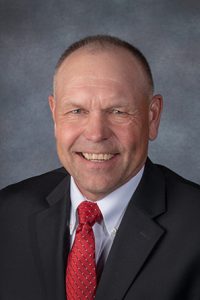Measure to tax services, fund property tax relief falls to filibuster
A proposal to impose the state sales and use tax on certain services to fund additional property tax relief stalled on general file May 19 after a failed cloture motion.

LB170, as introduced by Plymouth Sen. Tom Brandt, would have imposed state sales tax on soft drinks and candy. He introduced an amendment that would replace the bill with a narrowed version of his LB169, which would impose the 5.5% state sales and use tax on nearly two dozen currently exempt services.
The new sales tax revenue would be used to provide an additional $100 million in property tax relief per year under the School District Property Tax Relief Act. Enacted by lawmakers during last year’s special session, the program distributes funds to counties, which then credit taxpayers against the amount of property taxes owed to school districts.
Brandt said the amendment would tax 18 “discretionary” services — including dry cleaning, swimming pool maintenance and golf lessons — in an effort to reduce Nebraskans’ local property tax burden, which he said is projected to increase by $283 million next year.
“What we are doing is cleaning up the tax code, removing outdated exemptions and ensuring everyone pays their fair share so that we can deliver real property tax relief for everyone, urban and rural alike,” he said.
Brandt said the newly taxed services would generate approximately $28 million in state revenue annually.
The amendment would raise another $42 million per year by increasing the excise tax on cigarettes from 64 cents to $1.36 per package, he said.
The measure also would impose sales tax on soft drinks and energy drinks, generating $25 million per year, Brandt said. The amendment would not tax candy, as LB170 originally proposed.
Also included in the amendment are the provisions of LB712, introduced by Sen. Jana Hughes of Seward, which would increase the excise tax on vaping devices to 40% of the wholesale price. Brandt said the change would increase state revenue by $15 million per year.
Elkhorn Sen. R. Brad von Gillern expressed “lukewarm” support for the proposal, saying he would prefer that the additional revenue be directed to the state’s General Fund. Continuing to add to the nearly $1.5 billion Nebraska spends on its two property tax relief programs each year is unsustainable, he said.
“If we need to do this this year to continue to keep the ball rolling until we can fix the systemic issues of property tax relief,” von Gillern said, “then so be it.”
Hughes supported the amendment, although she agreed that her LB303, which would increase state funding to public schools while decreasing the maximum school levy, would be a better long-term method to reduce property taxes.
In the meantime, she said, Brandt’s proposal would provide additional relief aimed at preventing Nebraskans on fixed incomes from losing their homes due to valuation increases.
“Their income didn’t increase, but they still have to pay the bill,” Hughes said. “It’s not a choice like it might be on the sales tax exemptions that we’re talking about.”
Sen. George Dungan of Lincoln opposed the amendment, saying it would raise taxes disproportionately on low- and middle-income Nebraskans while providing relatively little additional property tax relief.
“There’s a number of folks on the left and the right who don’t want to see just everyday people … bearing the brunt of paying for property tax relief for the wealthy,” he said.
Whitman Sen. Tanya Storer also opposed the measure. She said lawmakers are only “feeding the monster” by directing more money to property tax relief rather than addressing local spending and other factors that lead to ever-increasing property tax collections.
Also opposed was Sen. John Cavanaugh of Omaha. He said his LB152, which would create a universal homestead exemption on the first $100,000 of taxable value of owner-occupied homes, would be a more efficient way to provide relief to Nebraskans who might not be able to keep up with increasing property tax bills.
After several hours of first-round debate, Brandt introduced an amendment that would strike the sales tax provisions from his original amendment. The smaller proposal would retain the provisions on vaping products and cigars and increase the excise tax on cigarettes from 64 cents to $1.64 per package.
Brandt said the pared-back measure would generate approximately $80 million in revenue per year for property tax relief.
Lincoln Sen. Jane Raybould supported the amendment. She said the state needs additional revenue to fund property tax relief until lawmakers can devise a more sustainable plan.
Dungan opposed the amendment, saying the tax increase likely would cause some people to quit smoking or vaping, leading to a “slow but steady drop” in revenue needed to fund the additional relief.
After eight hours of debate, Brandt filed a motion to invoke cloture, which ends debate and forces a vote on the bill and any pending amendments.
The motion failed on a vote of 30-15. Thirty-three votes were needed.
LB170 is unlikely to be scheduled for further debate this session.


